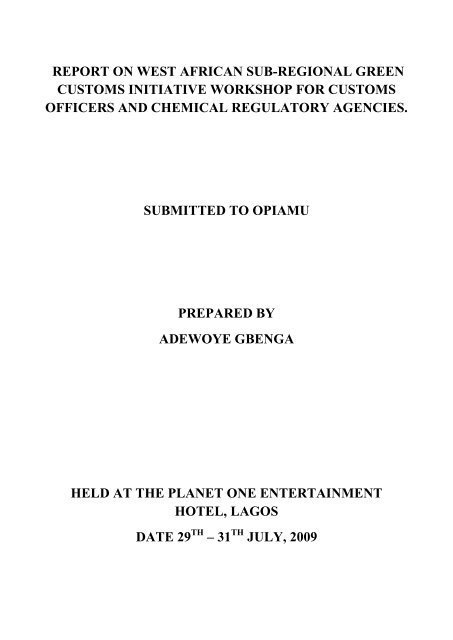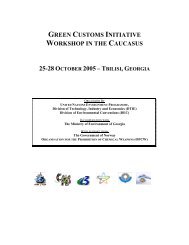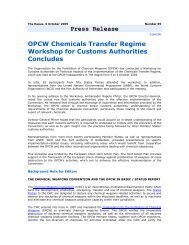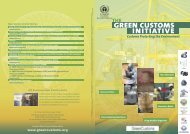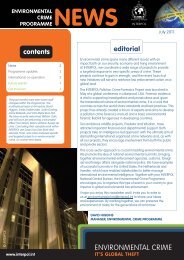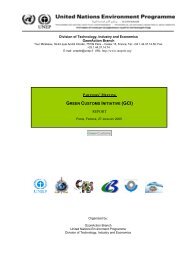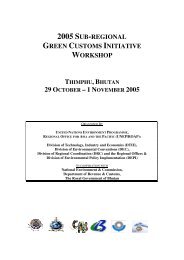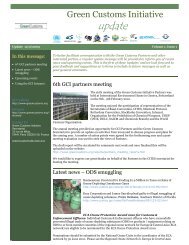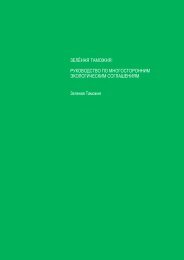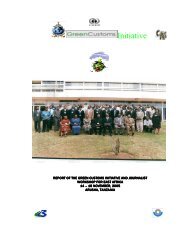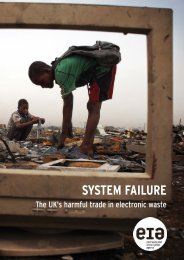workshop report. - Green Customs Initiative
workshop report. - Green Customs Initiative
workshop report. - Green Customs Initiative
You also want an ePaper? Increase the reach of your titles
YUMPU automatically turns print PDFs into web optimized ePapers that Google loves.
Introduction:<strong>Green</strong> <strong>Customs</strong>, the <strong>Initiative</strong>Environmental Crime is a significant and increasingly lucrative business. National and internationalcrime syndicates worldwide earn an estimated US$ 20-30 billion annually from hazardous wastedumping, smuggling prescribed hazardous materials, and exploiting and trafficking protectednatural resources. Illegal international trade in “environmentally–sensitive” commodities such asozone depleting substance (ODS), toxic chemicals, hazardous waste, endangered species and livinghealth and the environment, contribute to species loss; result in revenue loss for government; andundermines the success of international environmental agreements by circumventing agreed rulesand procedures.The <strong>Green</strong> <strong>Customs</strong> <strong>Initiative</strong> is an unprecedented partnership of international organizationscooperating to prevent the illegal trade in environmentally-sensitive commodities. Its objective is toenhance the capacity of customs and other relevant enforcement personnel to monitor and facilitatethe legal trade and to detect and prevent illegal trade in environmentally–sensitive commoditiescovered by the relevant conventions and multilateral environmental agreements (MEAs). Theseinclude: ODS; toxic chemical products; hazardous waste; fauna and flora; and living modifiedorganisms. This is achieved by raising awareness on all the relevant international agreements aswell as provision of assistance and tools to the enforcement community. <strong>Green</strong> <strong>Customs</strong> isdesigned to complement and enhance existing customs training efforts under the respectiveagreements.In view of the above, UNDP in collaboration with UNEP organized a 3-day training <strong>workshop</strong> on<strong>Green</strong> <strong>Customs</strong> <strong>Initiative</strong> at Planet One Entertainment Hotels, Lagos for <strong>Customs</strong>, Ozone Officersand professionals of Chemical Regulatory Agencies in the West African Sub-region: Nigeria,Gambia, Sierra Leone, Ghana and Liberia, who will subsequently be involved in enforcement ofMEAs.1
The second lecture was given by Dr. Ezra Clark who gave an introduction to the <strong>Green</strong> <strong>Customs</strong><strong>Initiative</strong> by enumerating the scale of environmental crime and various chemicals traded ashighlighted earlier. The consequences, he said, include environmental pollution, loss of revenueand its serious implication in undermining MEAs.He informed participants of the need for action by customs and border protection officers throughdefense against trans-boundary illegal trade, compliance and enforcement, facilitating legal trade,capacity building and training coordination. He also mentioned various MEAs listed above,including Convention on Biological Diversity, international organizations, chemical weapons andpartner organizations.He enumerated the benefit of <strong>Green</strong> <strong>Customs</strong> <strong>Initiative</strong> to <strong>Customs</strong> Officers, countries and MEASecretariat and the global environment. He also mentioned many successful GCI <strong>workshop</strong>s held in2007 and 2008 in Africa and Asia respectively and the 10 national and regional <strong>workshop</strong>s plannedincluding two jointly held by WCO GCI in Delhi, India and Mombassa, Kenya and other eventsstated for 2009.He listed the various achievements recorded through the <strong>Green</strong> <strong>Customs</strong> <strong>Initiative</strong> one of which isthe integration of <strong>Green</strong> <strong>Customs</strong> into national training curricular and resource mobilization.The third presenter was Hui-Fu who gave an introduction to World <strong>Customs</strong> Organization (WCO)and stressed that <strong>Customs</strong> play a critical role in implementing trade related MEAs at the border. Heexplained that because <strong>Customs</strong> officers are not experts on MEAs, they are faced with a number ofchallenges. He therefore identified information sharing as essential for any successful enforcementand such information should be exchanged in a simple and easy way.He informed the participants that WCO recommendation on actions against environmental officersin June 2008 called for increased effort to cooperate and exchange information among playersresponsible for implementing the MEAs. He informed the participants of the introduction ofENVIRONET in early 2009, a communication tool for information exchange and cooperation inthe areas of environmental border protection. He said users are connected via addresses withseparate login and passwords. He described the system as cost effective, user friendly and free ofcharge. The objective of the ENVIRONET is to share best practice and provide downloadabletraining materials. Other objectives are to create a discussion forum for specific topics and facilitatecooperation between customs administration, competent agencies and international organizations.He discussed the scope of information covered to include that which relates to customsenvironmental border protection; in particular those related to MEAs; information related to nuclearmaterials and illegal trade in timbers. Unregulated and uninterrupted fishing may also be included.He went further to identify the group of user and topics. He shed more light on the rules that guidethe application which must be submitted to the WCO secretariat. Other issues are e-mail alert,Technical equipment, language privacy protection and liability.The highlight of the Montreal Protocol was presented by Dr. D.B. Omotosho. He started bydefining the ozone layer as a thin layer of three molecules of oxygen 45km above the earth and thelife is sustained on earth by fighting dangerous UV rays from the sun.He said that ODS destroys the ozone layer. These include CFCs used in refrigeration, foam makingas Aerosols, Halogens used in fire fighting, methyl bromide used for preservation of grains and forsoil fumigation.4
He stated that the negative impact of ozone layer depletion to mankind include incidences of eyecataracts, skin cancer, decrease in plant production, suppression of human immune system amongothers.He informed the participants of the Vienna Convention of 1985 which was non committal, howeverresulting to the international convention of 1987 known as the Montreal Protocol on substances thatdeplete the ozone layer, an agreement that is legally binding on parties as amended in London,Copenhagen, Montreal and Beijing. He said Nigeria has been a party to the Montreal Protocol andco-sponsor of Article by setting up the MLF. As a demonstration of this commitment, lots ofprojects have been undertaken in the foam sector, solvent R & A (manufacturing and services)sector. He highlighted the role of customs as the first line of defense against illegal trade in ODS, inthe Trainers Workshop of 2006 and the presentation of Gas identifier in 2007. While more training<strong>workshop</strong>s were also put in place in 2007 and 2008. This culminated into the training of <strong>Customs</strong>agents and Freight forwarders in 2009 and today the UNDP and UNEP have put together the GCI<strong>workshop</strong> to train <strong>Customs</strong> officers and chemical regulatory agencies.The fifth lecture was given by Johansen Voker. The presentation was on Cartagena Protocol onBiosafety: overview for <strong>Customs</strong> Officers presented facts and figures on various negotiation andadoption under the convention on Biological Diversity and subsequent ratification of theconvention. He said Nigeria became a party on 13 th October 2003. He commented that Biosafetyprotocol is the only International instrument that deals exclusively with living modified organism(LMOs). The protocol defined an LMO as a living organism that possesses a novel combination ofgenetic material obtained through the use of modem biotechnology and the objective is to ensurethe safe transfer, handling, and use of LMOs resulting from modem Biotechnology that may haveadverse effect on the conservation and sustainable use of biological diversity taking into accountthe risk to human health.He discussed the precautionary approach through objective, safety transfer, handling and use ofLMOs. He expatiated on the category of LMOs under the protocol and their requirement.He said that the role of customs officers in promoting implementation of the protocol is to ensureproper approval for LMO imports which should be accompanied with proper documentation,verification, detection of illegal LMO import and taking appropriate measures among others. Othergeneral responsibilities are regular communication with the competent National Authority anddetection and escalation to the relevant authorities of possible illegal import and international Transboundary movement of LMOs.He concluded by submitting that Cartagena Protocol on Biosafety recognizes the potential ofbiotechnology if developed and used with adequate safety measures. And the Protocol is intendedto ensure safety of LMOs, not to prohibit trade and customs officer have an important role to playin its implementation.The introduction to Rotterdam convention was presented by Dr. I.A. Goji. He said the objective isto promote shared responsibility for certain hazardous chemicals and cooperative effort amongparties in the international trade in order to protect human health and the environment frompotential harm and contribute to their environmentally sound use. This is carried out throughwarning, various decision regarding future import of chemicals and enforcement of decisions. Hediscussed the need for protection of health through trade provision by effectively ensuring thattrade provisions relevant to the convention is respected. <strong>Customs</strong> officers directly contribute to theprotection of human health and the environment.5
He said there is a need for adequate information exchange between those responsible for theimplementation of the convention at the national level. The duty of national customs officers is toimplement the provision of Rotterdam Convention.He submitted that the key action required by <strong>Customs</strong> officers include knowledge of existingmaterials, import decision and understanding of key parties in trade, relevant information underarticle 10 and 11 of the convention.He said the convention does not apply to Narcotic drugs, radio materials and other chemical notlikely to affect human health or the environment provided they are imported for the purpose ofresearch or individual use. The Rotterdam convention applies to banned or severely restrictedchemicals and severely hazardous pesticide formulation.He said the Rotterdam convention contains two key provisions relevant to trade: the prior informedconsent (PIC) procedure and Information Exchange. He therefore provided a list of chemicalswhich are subject to PIC procedure naming 40 chemicals, 25 pesticides, 4 severely hazardouspesticide formulations and 11 industrial chemicals that are currently included.He said the convention facilitates the exchange of information among parties on a very broad rangeof potentially hazardous chemicals and reduction of illegal and unwanted trade. He mentionedpartner to the convention as Basel convention Stockholm.He concluded that the secretariat of the Rotterdam Convention will continue to provide informationat National and regional <strong>workshop</strong>s on the implementation of <strong>Green</strong> Custom <strong>Initiative</strong> and are alsocooperating with the secretariat of the Basel and Stockholm conventions to ensure synergy in<strong>Customs</strong> activities among the three conventions is achieved.DAY 2The opening ceremony of the <strong>workshop</strong> on the <strong>Green</strong> <strong>Customs</strong> <strong>Initiative</strong> commenced at about10:10am with the Comptroller of the Nigerian <strong>Customs</strong> Service chairing the occasion. There wereabout eighty participants in attendance. The <strong>workshop</strong> which was co-sponsored by the UNDP andUNEP was aimed at increasing the capacity of customs officers and staff of chemical regulatoryagencies.The first speaker of the day was the representative from UNEP who expressed pleasure at beingpresent at the development initiative which had started in other countries and is now in African andNigeria. He said the training <strong>workshop</strong> will go a long way in strengthening the capacity of thecustoms officers and the chemical regulators.The second address was made by the Minister of the Federal Ministry of Environment representedby Ibrahim Danbatta. He acknowledged the role of the implementing agencies, UNDP and UNIDOwith which they have been enjoying good collaboration in the execution of ODS phase outprogramme. With UNDP as the lead implementing agency and UNIDO as the cooperating agencyfor project preparation for HPMP, he counts on the same expert delivery as with previous projects.He thanked the various enterprises, relevant agencies like NAFDAC, SON and The Nigerian<strong>Customs</strong> Service and of course the press for their cooperation and collaboration towards ensuring asuccessful implementation of phase out projects in the entire sector.In her speech, the representative from NESREA expressed her feelings on lack of proper legislationand enabling environment coupled with limited capacity of the enforcement officers. She however6
said that to meet the Montreal protocol there was the need to build the capacity of the enforcementofficers through training and information sharing. She therefore commended and supported theorganizer of the <strong>workshop</strong> and wishes the participants a worthwhile experience.The fourth address was given by the Comptroller General of the customs who declared the<strong>workshop</strong> open. In his opening address he gave a brief review of the good and rewardingcollaborative efforts between the customs, the federal ministry of Environment and the OPIAMU inorganizing ten training <strong>workshop</strong> for men of the service in Lagos, Port Harcourt and Kano in whichmore than 500 officers were trained (TOT); which later turned to training of about 500 customsagents and freight forwarders in Lagos. He therefore submitted that the ozone programme of UNDPhas assisted the service in steadily building a crop of chemically conscious officers, a progressbeing taken to a new pedestal with the current <strong>Green</strong> <strong>Customs</strong> <strong>Initiative</strong> Workshop, which we aresure will help the service in its repositioning efforts for greater professionalism aimed at facilitatingtrade not only with the African neighbors but also with other countries of the world. He thereforepledged to continue to cooperate with all stakeholders in assisting Government to meet its bindingobligation not only under the Montreal protocol, but also under all the other MEAs that has signed.He therefore declared the <strong>workshop</strong> opened.The last address was given by the representative of UNDP and head of OPIAMU. He provided alittle background and reminded the participants of Nigeria’s signatory status to the MontrealProtocol on the Substances that Deplete the Ozone Layer. He explained that Nigeria is expected tocontrol the importation and use of the affected substances and finally stop such importation byJanuary 1 st 2010. To enable Nigeria achieve this, the executive committee of the Multilateral fundsfor the implementation of the Montreal Protocol at its 38 th meeting approved a national CFC phaseout plan for Nigeria. The plan includes, among others, training of customs officers and otherchemicals regulators to help implement the required control as well as the provision of gasidentification equipment to enable officers identify the affected chemicals under the MontrealProtocol for effective import monitoring and control. He mentioned that various trainings beenconducted with the Nigerian customs service since 2006, appraising the collaborative efforts ofUNDP, NCS and the Federal ministry of Environments being taken to a higher pedestal with the<strong>Green</strong> <strong>Customs</strong> <strong>Initiative</strong> <strong>workshop</strong> organized by UNDP through its project office, OPIAMU forcustoms officers from English speaking West African countries and other chemical regulatoryAgencies in Nigeria. The purpose of the <strong>workshop</strong> is to raise the capacity of customs officers andstaff of chemical regulatory agencies on several MEAs at the same time under one programme.This partnership of International organizations aims at enhancing officers’ capacity to detect an actof illegal trade in environmentally sensitive items cover by the related agreement. The organizationcooperating on the GCIs are The World <strong>Customs</strong> Organization (WCO), Interpol, The Organizationfor the Prohibition of Chemical Weapons, The Secretariats of Six MEAs (Montreal Protocol, BaselConvention, Stockholm Convention, Rotterdam Convention, CITES, and Cartegina Protocol) andthe United Nations Environment Programme (UNEP). He implored the leadership of the customs toincorporate the training into the custom curriculum even as he presented the identification kits onbehalf of UNEP and UNDP to the Comptroller general of customs for effective monitoring andcontrol. There were group photographs taken by the participants with the UNEP and UNDPofficers before the departure of the special guest.It was on this note that the first presenter of the day was called upon to make her presentation.The introduction to the Stockholm convention on Persistent Organic Pollutants was presented byStella Mojekwu from Federal Ministry of Environment. She informed the participants of theobjective of the convention to protect human health and environment from persistent organic7
pollutants and this came into force in May 17, 2004 with about 106 countries as parties to theconvention.She described the POPs= Persistent Organic Pollutant as highly toxic, persistent, moble and Bioaccumulating.She also mentioned 12 POP chemicals with 9 additional new chemicals. She saidthat the convention’s controlling strategy is to prohibit/take measures to eliminate/restrict, theproduction and use of POPs chemicals, import and export of POPs chemical and the article talkedon measure to ensure POPs chemicals are imported only for environmentally sound disposal or fora special permitted use. While the PCB, equipment is to be identified, labeled and removed fromuse by 2025 and should be disposed of / eliminated by 2028, the role of <strong>Customs</strong> is to control theimport and export of i-POPs chemical Information Exchange and <strong>report</strong>ing. There were questionsand answers and contributions by the participant.There was a presentation on CITES convention on international trade in endangered species of wildfauna flora. He said the convention aims to ensure that international trade in specimens of wildanimals and plants does not threaten their survival. CITES has been in force since 1975, andcurrently has 173 parties. The trade in CITES-listed species is diverse, ranging from live animalsand plants to food products, exotic leather goods, wooden musical instrument, timber, touristcurios, medicines and other wildlife products. The convention accords varying degrees ofprotection to more than 33,000 species of animals and plants, whether they are traded as livespecies or as raw or finished products.The resource person enumerated the role of <strong>Customs</strong> officers, or border control officers, in theCITES process to conduct documentary and physical inspections, to check the validity of thedocument submitted, and to ensure that they correspond to the actual goods. They also combatfraud and check compliance with prohibition and restriction measures, collect duties and taxes, and,in many countries, conduct investigations at traders’ premises or carry out checks on the transportof goods within the country. <strong>Customs</strong> officers also help to inform the public about conversationmeasures in place for fauna and flora. Some countries have <strong>Customs</strong> units that specialize in CITESmatters.In carry out this mission, he stressed that <strong>Customs</strong> officers are not alone. Experts may assist in theidentification of specimens, and the CITES Secretariat and various CITES Management Authoritiesproduce manuals on how to identify species. <strong>Customs</strong> laboratories or other scientific institutionsmay analyze certain products to determine whether they contain CITES specimens, and CITESManagement Authorities help <strong>Customs</strong> administrations solve the problem of what to do with liveanimal or plants they seize. There were questions and answers, and contributions from theparticipants.The third presentation for the day was on Basel convention. The presenter informed the participantsthat the convention was established to regulate the Trans boundary movement of hazardous wasteand other waste. The obligations and procedure of the convention apply whenever hazardous wasteand other waste covered by the convention cross from one national jurisdiction to another, whetheror not the waste are being shipped as part of a commercial transaction or under a tradingrelationship.He emphasized that because the convention regulates movement across international frontiers, itseffective implementation by national <strong>Customs</strong> officer or frontier controls is essential to ensuringcompliance with the convention. The Basel convention was adopted on 22 nd March 1989, and itwent into force on 5 May 1992*. There are 170 parties to the Basel convention. He stated that theobjective of the customs was to reduce Trans boundary movement of hazardous waste and otherwaste to a minimum consistent with environmentally sound management, to treat and dispose of8
hazardous wastes and other as close as possible to their source of generation in an environmentallysound manner, to minimize the generation of hazardous waste and other waste in terms of bothquantity and potential hazard. To achieve these objectives, the Basel convention has established aregulatory system based on the following: The requirement of prior informed consent of a State ofimport and State of transit before a waste can be exported and, to this end, the establishment of anotification procedure and imposition of restriction on exports to a country that is not a party to theconvention, as well as a duty to re-import when an expert has not complied with the provisions ofthe convention.He therefore informed the participants that Parties are obliged to take the appropriate measures toensure that the trans boundary movement of hazardous waste and other waste is allowed only if (1)the state of export does not have the technical capacity and the facilities, capacity or suitabledisposal sites needed to dispose of the waste in question in an environmentally sound manner (2)the waste in question is required as raw material for recycling or recovery industries in the State ofimport. The convention permits the parties to adopt other applicable criteria from time to time.Such criteria are normally found in the decisions adopted by the Conference of the Parties, whichare binding on all Parties.Basel convention provides for, and permits parties to place, prohibitions on exports and imports.Specifically, Parties have the right to prohibit the import of hazardous waste or other waste intotheir jurisdictions for disposal.‣ Parties must not allow the export of hazardous waste or other waste to a State or group ofState belonging to an economic or political integration organization that has, by legislationprohibited all imports. For example, such legislation may have been adopted by Africancountries in accordance with the Bamako Convention, which prohibits the import ofhazardous waste into Africa.‣ A Party must not allow exports to a State when it has reason to believe that the waste inquestion will not be managed in an environmentally sound manner.‣ A Party is prohibited from exporting wastes to, or importing wastes from, a non party.Such exports/imports are permitted if the Party has entered into a bilateral agreement orarrangement on the Trans boundary movement of hazardous waste or other wastes withthe non-Party, or is a party to a multilateral or regional agreement that also involves thenon-Party, as long as the agreement does not derogate from the environmentally soundmanagement of hazardous waste and other waste as required by the Basel convention.‣ Parties are prohibited from exporting waste falling within the scope of the convention fordisposal within the area south of latitude 6 o south, whether or not such waste are subjectto Trans boundary movement (Article 4(6)). The Competent Authority, when consideringwhether to permit a trans-boundary movement, must verify that the request is consistentwith any relevant restriction (for example, import bans on certain waste streams or specialprocedural requirements provided by national definitions).He concluded that to foster effective enforcement of the Convention’s obligations, the nationalcompetent authority should also ensure that customs officers are kept informed of any restriction orrequirements that derive from the convention or from measures adopted by individual States, sothat they can take these into account when verifying shipments at the border.The fourth presentation of the day was given by Johansen Voker convention on the prohibition ofthe Development, production, stockpiling and use of chemical weapons and on their destructionwhich entered into force in 1997. One hundred and eighty-four States are party to the convention9
(see figure 2-12). The main objectives of the convention are to prohibit the development,production stockpiling and use of chemical weapons; to seek the destruction of existing stockpilesof the activities not prohibited under the Convention. The verification regime established by theconvention consists of declarations by State Parties and inspection of relevant facilities by theOrganization for the Prohibition of Chemical Weapons (OPCW). The Convention commits its StateParties to working together to promote peaceful uses of chemistry for the purpose of pursuing theireconomic and technological development. Countries that do not have chemical weapons and thatdo not feel threatened by chemical weapons join the convention largely because they not onlysupport the ban on chemical weapons, but also want to develop their chemical industries and takepart in science and technological exchange in the interest of chemistry for peaceful purpose.The convention affects a specific segment of the global chemical industry. In accordance with itspurposes, the term chemical industry comprises all chemical, pharmaceutical and agrochemicalenterprises and other related sector that not only produce, process and consume, but also tradeinternationally those chemical identified in the convention for verification purposes. Thus not onlythose firms or plants grouped within the traditional chemical industry sector may be subject to theconvention’s provisions, but also companies or facilities within other industries or commercialsectors.He mentioned the role of customs to include collecting export and import data and <strong>Customs</strong>officers play a crucial role in helping National Authorities to comply with the conventionrequirements by: Providing details of declarable import/export data for compilation of CWCdeclarations, Enforcing restrictions on the transfers of scheduled chemical to State not party,Validating data from different sources, Enforcing national regulations, such as implementinglegislation for the convention that may require issuance of import/export licenses for the transfer ofscheduled chemical, Resolving discrepancies in data declared by other State Parties that are tradingpartners through the extensive international <strong>Customs</strong> networks.There were contributions questions and answers and the <strong>workshop</strong> for the day came to a close atabout 5:55pm.DAY 3The day’s activities commenced at about 9:30am with a recap of the previous day’s session. Theparticipants were divided into four groups to produce an action plan with time frame of which to beaccomplished and the responsibility. The participants were therefore grouped as follows;GROUP 1 GROUP 2Abdou Jeng,Yancy ColeBarbara KoomsonAliu G.TJ,VokerBabalola A.O10
E. EmbiemuMondi AzanorSuleiman A.DWada C.DR. BilesanmiOunyekwelu I.UUkpanah I.WIbrahim ShuaibuDioka EjionuemeHwesa MaosehEmmanuel AkposO. AKunalsK.O. OlogeStella MojekwaYunus M.OGeorge ArinzeUkonu AnyuKasimu J.S.Mould Y.ES. OtenaikeAdeyemo G.OKolowole FunleeMundu H.MNkayuk Sampson MoshJamos A.MAboyoni JecksonS.O.TundeGabriel SundayAbita OlanifuNonye AghajiGROUP 3 GROUP 4John KamaraEarl NabletRonke SoyombIbrahim B.DA.B. MahommedOchai N.AObi D.CBakie MinahEmmanuel Osae QuansahBenjamin T.Joseph O. AttahOsuangwu E.Elumelu F.Umoh N.P11
Ousioma FUmaru A. BOluwatayin OChinedu .US.K. RufiaBennett O.Ekene ObidikeEmeka OkoyeA.J AdegbuteImanyi IsaacMusa MBAJ. MaxwellIdris GojiOgunmala TobaFred .O. AkingbesofeA.K. BayeroYinka IbitoyeOrafu V.Ekon N.EGumel T.AK. IfekayaAbubakar M.G12
Group PresentationsGROUP 1 PRESENTATIONSN PROBLEMS SOLUTIONS TIMEFRAME RESPONSIBILTY REMARKS1.0 Lack of <strong>report</strong>on trainingsBack to office<strong>report</strong> to themanagement oftheorganizationImmediately All participants.2.0 Lack ofawareness ofMEAs on thepart of theCustomOfficers untilthis <strong>workshop</strong>More capacitybuilding andtraining. MEAsshould beincluded intothen Customcurricularparticularly forthe newintakes.OngoingFederal Ministry ofEnvironment totake the lead incollaboration withcustoms and allother stakeholdersTraining offield officers atthe borders.Individuals areencouraged tosource moreinformationfrom thewebsite.Ministry ofInformationandCommunicationand theNationalOrientationAgency shouldbe part of thetraining andimplementationthe MEAsFederal Ministry ofEnvironment incollaboration withMinistry of Justice13
6.0 Lack ofpolitical will.Emotionalpresentationusing pictorialevidence of theeffects of theeffects to thepoliticians.As soon aspossible7.0 Porous border Apply theknowledgeacquired fromthis <strong>workshop</strong>to our dailyactivity<strong>Customs</strong> and allparticipantsIntensify borderpatrol.CommunitypolicingFederal Ministry ofEnvironment incollaboration with<strong>Customs</strong> and otherstakeholdersAs soon asCountries ratifythese MEAssteps should betaken towardstheirdomestication,awarenessraising,implementationandenforcement.Federal Ministry ofEnvironment incollaboration withother stakeholders8.0 Lack offollow upafterratification ofMEAsAll agenciesshould seethemselves asparties inprogress in theimplementationof the MEAsOngoingAs soon aspossible<strong>Customs</strong> to liaisewith the FederalGovernment15
9.0 No propercollaborationbetween theDNAs and<strong>Customs</strong>Mobile customlaboratory forpreliminarytesting.On goingAs soon aspossible10.0 Lack oflaboratoryanalyticalcapacityGROUP 2 PRESENTATIONSNOACTION TIME FRAME RESPONSIBILITYREMARKS1<strong>Customs</strong> administration to prioritize theissue of enforcement of MEAs.Immediate [ 2months]AllparticipantsTop priority1aCapacity building of officers onenvironment and to safely handlehazardous chemicalsImmediate [2 month]Allparticipantsof AllcountriesTop priority1bAwareness through the mass mediaespecially on the legal provisions of theMEAs by UNDPImmediate[continuous]AllstakeholdersTop priority1cCooperation by all stakeholders throughprompt action in the case of seizure anddetention of environmentally sensitivecommoditiesImmediate[continuous]AllStakeholders2Provision of mini port laboratory andequipment for customs6 MonthsFederalGovernmentTop priority3Increase synergies, collaboration andunderstanding amongst the variousservice arms responsible for MEAsImmediateAllStakeholders16
4The focal point should [ DNA] shouldalways engage the customs on theirvarious meeting to agree on the wayforward relative to enforcement ofMEAsImmediateMinistry ofEnvironment and theDNA’s5Forge further collaboration withregional customs as well as EPSs.Immediate<strong>Customs</strong>administrations andMinistries ofEnvironment6Emphasize the importance RILOtraining and applications and access toWCOs databaseOngoingWCO,<strong>Customs</strong>administration7<strong>Customs</strong> enforcement network on ODSto be expanded to include other MEA’smore personnel, more funding.ImmediateWCO,DNA’sAND<strong>Customs</strong>administration8ECOWAS to facilitate sub regional<strong>workshop</strong>s and the enforcement of theMEAs1 YearECOWAS,NationalGovernment, EPAs.Top priority17
GROUP 3 PRESENTATIONSNOACTIONTIMEFRAMERESPONSIBILITYREMARKS1All countries should be encouraged tocontact the Secretariat on procedures tobecome parties signatories to all MEAs ofthe <strong>Green</strong> Custom <strong>Initiative</strong>Med-LongFocal point of MEAs,Ministry ofEnvironment, Justice,Foreign Affairs2All countries are encouraged to ratify andDomesticate the MEAsMed-LongFocal Points3Countries should contact the Secretariatswith their specific needs of support andcapacity buildingShortMEA focalpoints/Custom4Countries Environment Ministries shouldendeavor to establish an EnvironmentDesk and request secretariat to fundestablishment of DeskShortMinistries ofEnvironment5Establish Strong coordination mechanismif it does not already existShortMinistries ofEnvironment6Ministry of environment to persuadecabinet to make budgetary provision tosustain the Environment DeskShortMinistries ofEnvironment7Develop sub-regional legislation, policiesand harmonized strategies to implementthe MEAsShort-long8Ensure the inclusion of EnvironmentalEducation and MEA implementation in thecurriculum of custom training18
NOACTIONTIMEFRAMERESPONSIBILITYREMARKS9Custom officer to be provided withall the relevant information toimplement MEAShortMEA/ Min. OfEnvironment10Countries should establish jointMonitoring Teams at the port ofEntry into Countries comprising of<strong>Customs</strong> and MEA officialsShortComplianceAgencies11MEAs should be part of the TariffTechnical CommitteeShortComplianceAgencies12<strong>Customs</strong> to train enforcement andcompliance agencies on newdocumentation and HS coding systemto establish the Synergies to ensurethe implementation of MEAsShort<strong>Customs</strong>13Custom Officers should be trained inGHS and training Manuals providedto <strong>Customs</strong>ShortMEAs/Min. OfEnvironment/Secretariats14Countries to facilitate an effectiveframe work together with thelegislation and Judiciary forpersecution of culpritShort-medMin. OfEnvironment,Justice,Parliament15Establishment of <strong>Green</strong> Custom Deskin <strong>Customs</strong>Short<strong>Customs</strong>16Establishment of a <strong>Green</strong> customwebsite for the green custom deskShort<strong>Customs</strong>19
GROUP 4 PRESENTATIONNO ACTION TIME FRAMERESPONSIBILITYREMARKS1Active involvement of customs indomesticating the various Protocols andMEAs covered by GCI, to give legalbacking to implementation.12 months (taking intoaccount MEAnegotiation timelinessNational focalpoint forrelevant MEAin collaborationwithstakeholders(which mustincludecustoms)2Awareness creation to the relevanttarget groups at the national level on theobjectives of the various MEAsongoingAll relevantstakeholders (inparticular<strong>Customs</strong> withthe Ministry ofEnvironment)Nigeria <strong>Customs</strong>Service has beenactive in the pastin creatingawareness on thesustainability ofthe environmentat various fora3Capacity building of enforcementagencies, on GCI through training andretrainingOngoing<strong>Customs</strong>,WCO, FederalGovernment ,InternationalAgencies,NGOs4Provision of relevant tools andequipment/facilities required forimplementation of the various MEAs.ASAP (Continuous)MEAsecretariats toprovidecustoms withrelevant toolsand make thesereadilyavailable.Enforcementagencies have arole in activelyseeking outexistingenforcementinformation andtools.20
5Create a stakeholders committee tohave an inter-agency relationship forcoordination/collaboration on MEAimplementation.4 Months to initiate <strong>Customs</strong>6Activate the operation of the RILOs andother sub-regional intelligenceinitiatives, including Interpol, andactively promote use of CEN, andENVIRONETASAP<strong>Customs</strong>RILO, Interpol,Use ofCEN,ENVIRONET7Sub-regional customs exchangeprogrammesForm Jan 2010<strong>Customs</strong>For enhancingcooperation andknowledge andbest practicesharingAfter the presentation of group work, there were contribution, questions and answer andrecommendation for future project.Field Visit to <strong>Customs</strong> FacilitiesAs part of the GCI <strong>workshop</strong>, participants had some field experience by visiting The NationalAviation Handling Company at the International airport. Deputy controller, J.O. Ajetunmobi theActing Area controller supported by two other controllers in the area, welcomed the organizer ofthe <strong>workshop</strong> and the participants. He later took them to the customs processing centre andexplained the responsibility of each processing unit as it affects the clearing of goods from theairport. There was also a comparison of these processing of goods from other sub-Regional Africancountries like: Ghana, Gambia and the Liberia. In Ghana for instance, where community network isbeing practiced shows an improvement on the clearing system with that of other countries. It washowever, seen that the process of clearing is similar with other African countries. Also, the visit atthe customs shed where goods are being stored before clearing is part of NAHCO work activities.The participants were welcomed and a numbers of Hazardous chemical were shown to them as itsaffect and their negative effects to the environment namely; photography materials, and otherchemical gas with different level of hazardous influence to the environment. These chemical arebeing classified and labeled in a separated shed.The participants therefore had physical assessment and experience of these hazardous chemical andtheir impact to the environment. The participant departed NAHCO office at about 12.15pm and Mr.Earl Neblet from Liberia gave the vote of thanks. He expressed satisfaction about the storage andprocessing procedure seen at the airport. He submitted that the processing and storage are the sameeven in his own country, while improvement is only required to further protect the safety of humanhealth and the environment. He thanked the management of NAHCO for giving them permission toinspect the existing facilities.21
Closing remarksThere were various submissions and expressions of gratitude from participants who described theGCI <strong>workshop</strong> as an exposure to the import of the Montreal protocol and other conventions, a lot ofinformation was gained from the <strong>workshop</strong> outside the revenue generation activities of the customs.The participants therefore thanked the organizer of the <strong>workshop</strong> and UNEP for the training at thistime and pleaded for continuation of such a <strong>workshop</strong> and sustainability of the programme by thegovernments of the participating countries, with or without UNEP. There was also a remark fromthe consultants who expressed that they were overwhelmed particularly for bringing together<strong>Customs</strong> Officers, Ozone Officers, Environmentalist etc as a dream fulfilled. He thereforeexpressed thanks to the organizer and the Nigerian government for the programme and hospitalityaccorded them.The closing remarks were made by the representative of UNDP and head of OPIAMU whoexpressed his joy and exhortation that as the brothers from sub Africa region leave, they shouldreflect on the opportunities that the <strong>workshop</strong> presented and how to key into them so that they cantake further action. He commended the UNEP on behalf of UNDP for showing commitment inensuring that the capacity of customs and chemical regulatory agencies are built. He finally thankedall the teams of consultants present, the organizing committee and the participants for making theevent possible.The <strong>workshop</strong> came to a close at about 5.45pm.General comments from the participantsLiberiaThe <strong>workshop</strong> is an exposure to the import of Montreal protocol and appreciates the organizer ofthe programme, for the wonderful achievements.GambiaThis kind of sub-regional <strong>workshop</strong> is a knowledge driven growth and a lot of knowledge have beentab which will help us at home.GhanaThe representative from Ghana express appreciation and submitted that a lot of information gainedfrom the <strong>workshop</strong> is more of outside revenue generation, he therefore, plead that the provision ofCD,s and more documentary should be made to the participants.NAFDACHe described the experience as remarkable and he implored the organizer to organize moretraining <strong>workshop</strong> and thanks the UNDP and UNEP for a successful <strong>workshop</strong>.Ministry of EnvironmentShe commended that UNEP have been preaching synergy among the convention, he thereforeadvice the need to sustained the programme whether with or without UNEP.Standard Organization of Nigeria (SON)22
It was a <strong>workshop</strong> that fulfilled my dreamNigeria <strong>Customs</strong> Service (NCS)Thanked the organizer of GCI <strong>workshop</strong> for good presentation and facilitation, they however wantmore training on Montreal Protocol23


